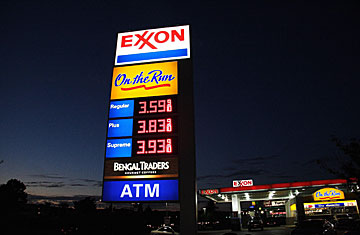
(3 of 4)
Why would these individuals or their companies risk their own money and reputations, should they be discovered? They don't need to. There's an anonymous investment vehicle — the hedge fund — with which they can even risk other investors' money for futures speculation. Although we're all affected by oil prices, we as oil consumers don't set the prices. Herein lies the problem. The futures market that serves as a price discovery mechanism for the physical oil market is open only to the elite. We trust these elites to determine the prices, but who are they? Who are the so-called experts? Hedge funds, oil companies, OPEC — the very people who profit from massive, consistent increases in prices. Notice a conflict of interest?
All an oil supplier would have to do to raise prices is buy up futures contracts.
It's not even that risky. Either the suppliers/investors risk an insignificant fraction of their gargantuan fortune, or they entice other investors to share the risk. With virtually unlimited resources and an actual tie to the underlying commodity, oil suppliers are in a far better position to accomplish this manipulation than, say, the Hunt brothers were during their attempt to corner the silver market in the 1970s.
It is in every oil supplier's best interest for prices to go up. Oil is a finite commodity. The world will eventually become more efficient and develop alternative energy sources. In the meantime, suppliers want to squeeze out as much profit as possible from their limited resources. Even if they know that the price of oil is too high (to the point of reducing demand) it is not in their interest to correct it. By setting prices in the smaller but more "trusted" futures market, oil producers realize multiplied gains on their physical oil sales.
Prices in the futures market — and, indeed, any real-life market on a standardized good — do not form where actual supply meets actual demand; they form where perceived supply meets perceived demand. Participants in the futures market merely represent the world around them. A veil has been placed over the public's eyes, and they accept this illusion of a fair price.
Unfortunately, the price set by the all-too-small futures market transcends oil to influence the entire American economy. Our oil-dependent economy is shaped by oil's arbitrarily determined price. In many ways, oil has become a pseudo-currency. Similarly, with oil traded internationally in U.S. dollars, the dollar is pegged against oil. While squeezing American industry, high oil prices also devalue the dollar. With the state of our economy reflected in the price of oil, it has become a new standard for valuing America. We are slaves to this black gold standard.
The American market system, purportedly a free market despite its flaws and gross inefficiencies, has opened this vulnerability. The oil suppliers may tighten the noose, but we tied it around our throats long ago. Hiding behind the wall of anonymity, the perpetrators profit and achieve their own ends, bringing down America in the process.
